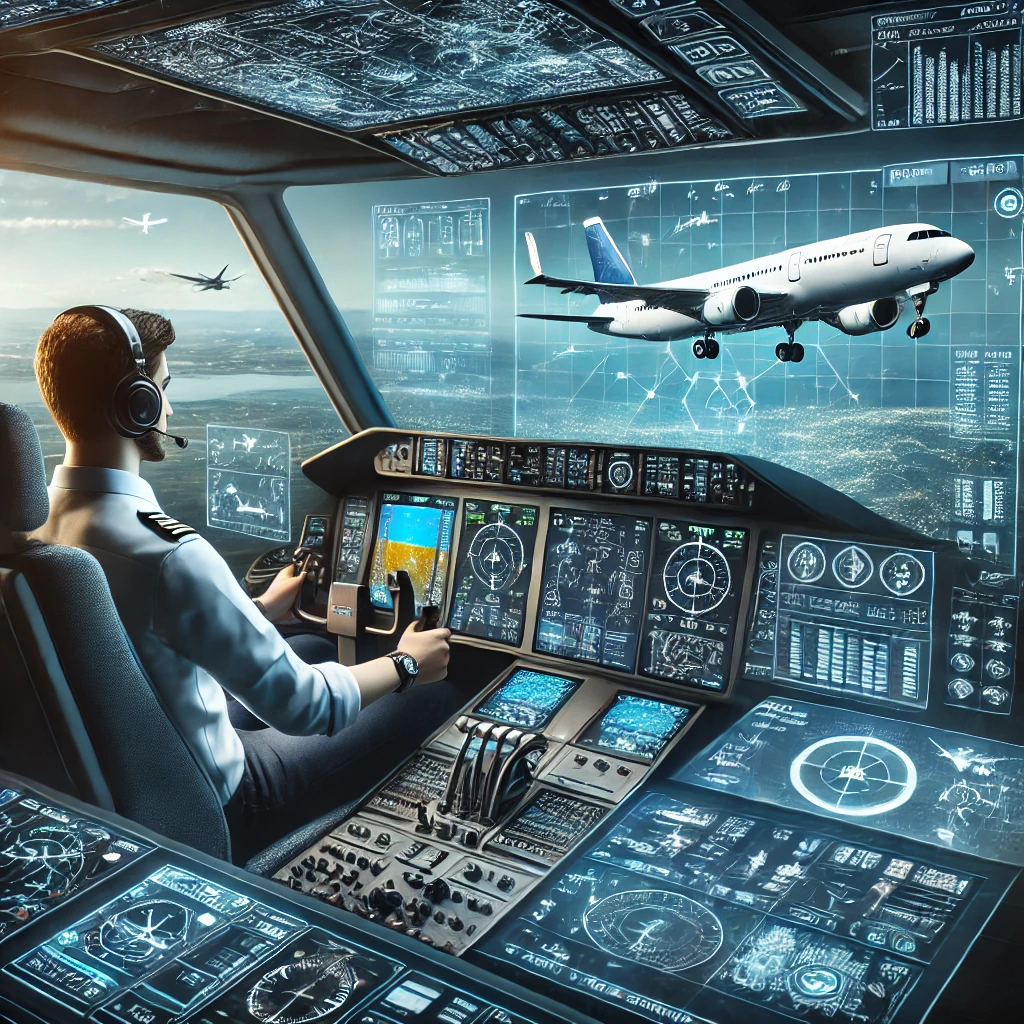
The Role of AI in Modern Flight Simulators
Table of Contents
ToggleHow AI is Transforming Flight Simulation

Flight simulation technology has evolved significantly, with artificial intelligence (AI) driving its realism and functionality. AI-powered flight simulators provide dynamic training environments, enhancing pilot skills and decision-making. These systems integrate adaptive learning, real-time feedback, and data-driven automation to create a highly immersive experience.
Flight simulators are essential tools in aviation training. They allow pilots to practice maneuvers, emergency responses, and navigation techniques in a controlled environment. With AI integration, flight simulators have moved beyond static training modules to create intelligent, responsive learning experiences tailored to individual pilots.
AI-Driven Realism in Flight Simulation
AI has enabled flight simulators to replicate real-world flying conditions with high accuracy. Modern AI-driven systems simulate:
- Weather Patterns – AI algorithms use real meteorological data to create realistic weather conditions, including turbulence, crosswinds, and storm patterns.
- Aircraft Behavior – AI models analyze real flight data to simulate accurate aircraft responses based on different variables.
- Air Traffic Environments – AI-generated air traffic scenarios mirror real-world airport congestion, ATC communications, and in-flight adjustments.
Realistic Weather Simulations
AI-driven flight simulators replicate real-time weather using vast datasets. Pilots can experience conditions such as heavy rain, icing, or sudden turbulence, ensuring they are well-prepared for real-world flying challenges. AI adapts the environment based on real meteorological patterns, providing realistic changes in wind speed, temperature, and visibility.
Adaptive Learning for Personalized Training
AI enables simulators to adjust training difficulty based on pilot performance. If a trainee struggles with specific maneuvers, the simulator modifies scenarios to target weak areas, making training more efficient and personalized. This dynamic system ensures pilots face progressive challenges, improving their ability to handle real-world situations.
Enhancing Pilot Training with Intelligent Feedback
AI provides real-time performance assessments, improving the way pilots refine their skills. Unlike traditional training systems with predefined exercises, AI evaluates pilot actions and offers instant feedback.
AI-Based Performance Monitoring
Flight simulators powered by AI monitor pilot behavior in real-time, assessing:
- Flight maneuver execution
- Adherence to protocols
- Emergency response efficiency
AI can analyze small details, such as how quickly a pilot reacts to a system failure or how accurately they follow ATC instructions. By gathering and processing this data, AI creates a detailed assessment, highlighting areas that need improvement.
Tailored Skill Improvement
AI-powered feedback highlights strengths and weaknesses, guiding pilots toward better proficiency. This technology ensures that trainees develop confidence and expertise before handling real aircraft. AI-driven training programs can track progress over time, helping pilots identify consistent areas for improvement while reinforcing strong skills.
AI-Powered Air Traffic Control (ATC) Simulation
Effective communication with air traffic control (ATC) is crucial for pilots. AI has improved ATC simulation, making it more realistic and interactive.
Simulating Realistic ATC Interactions
AI-driven ATC systems provide:
- Automated, voice-recognizing ATC responses
- Scenario-based clearances for takeoff, landing, and in-flight adjustments
- Emergency communication simulations for better crisis preparedness
ATC communication is a critical component of aviation safety. AI helps pilots practice clear and precise communication by simulating real-world interactions with controllers. These simulations prepare pilots for high-pressure situations, reducing communication errors that could lead to operational risks.
Adaptive Speech Recognition
AI adapts to pilot speech patterns, enhancing interaction accuracy. Pilots receive realistic ATC communication experience, reducing errors and improving their readiness for real-world flights. AI systems also assess pilots’ verbal responses, identifying hesitation or miscommunication that could be addressed in further training.
Smarter Cockpit Automation and Decision-Making
AI enhances cockpit automation within flight simulators, closely mimicking real-world avionics systems.
Realistic Avionics Training
Modern AI-powered simulators replicate advanced flight deck systems such as the G1000, a widely used digital avionics suite. Pilots can train on real-world cockpit automation, navigation displays, and autopilot settings.
With the increasing reliance on digital cockpits, AI-driven simulations ensure that pilots develop proficiency in managing avionics. This familiarity is essential, as many commercial aircraft incorporate sophisticated automation that requires precise handling.
AI-Driven Decision Support
Simulators present real-time challenges, such as:
- System malfunctions
- Sudden weather shifts
- Mid-flight reroutes
Pilots must analyze data, make quick decisions, and adapt to the scenario, improving their crisis management skills. AI evaluates how pilots respond under pressure, providing insights on decision-making processes and situational awareness.
Customizable and Adaptive Flight Simulator Setup
AI-powered simulators offer a flexible flight simulator setup that caters to different skill levels, from beginners to experienced pilots.
Personalized Training Programs
AI enables adaptive training modules based on pilot progress. If a user excels in basic maneuvers, the system introduces complex scenarios such as engine failures or emergency landings. This tailored approach ensures that pilots continuously develop their skills, moving from fundamental operations to advanced decision-making.
Dynamic Scenario Adjustments
Flight simulators modify training content dynamically, ensuring pilots remain engaged and challenged throughout their sessions. Whether a pilot is training for commercial aviation, military operations, or private flights, AI adapts the exercises to meet specific training goals.
The Future of AI in Flight Simulation
Artificial intelligence continues to revolutionize flight simulation. Future developments may include:
- More sophisticated AI-driven ATC interactions
- Enhanced biometric monitoring for stress and fatigue detection
- AI-generated emergency response drills for extreme situations
- Machine learning algorithms that create even more realistic pilot behavior simulations
As AI advances, flight simulators will integrate deeper levels of data analysis, providing more precise and effective training solutions. The aviation industry is continuously seeking ways to improve safety and efficiency, and AI-powered simulation plays a key role in achieving these goals.
Conclusion
AI-powered flight simulators have reshaped aviation training, offering realistic weather replication, adaptive learning, and intelligent feedback. With AI-driven cockpit automation and ATC simulations, pilots gain invaluable experience in handling real-world flying conditions.
These systems enhance pilot readiness, ensuring they are well-equipped to manage in-flight challenges. As AI technology advances, flight simulation will continue to play a vital role in pilot preparation and aviation safety. The ability to train in a highly realistic, data-driven environment prepares aviators for real-world operations, making AI an indispensable tool in modern flight training.
FAQs
What is the role of AI in modern aviation?
AI improves flight safety, automates navigation, optimizes air traffic management, and enhances pilot training with data-driven decision-making.
What is the role of AI in simulation?
AI makes simulations more realistic by replicating real-world conditions, adapting training scenarios, and providing intelligent feedback for skill improvement.
Does Flight Simulator use AI?
Yes, flight simulators use AI for realistic weather, dynamic air traffic, adaptive difficulty levels, and automated ATC interactions.
What is the role of AI in aviation security?
AI enhances security by detecting threats, analyzing passenger data, automating surveillance, and improving risk assessment in real time.
You May Also Like

Vidwud AI Dance Generator
2 January 2025
AI Data Storage Solutions for Performance at Scale
30 December 2024

